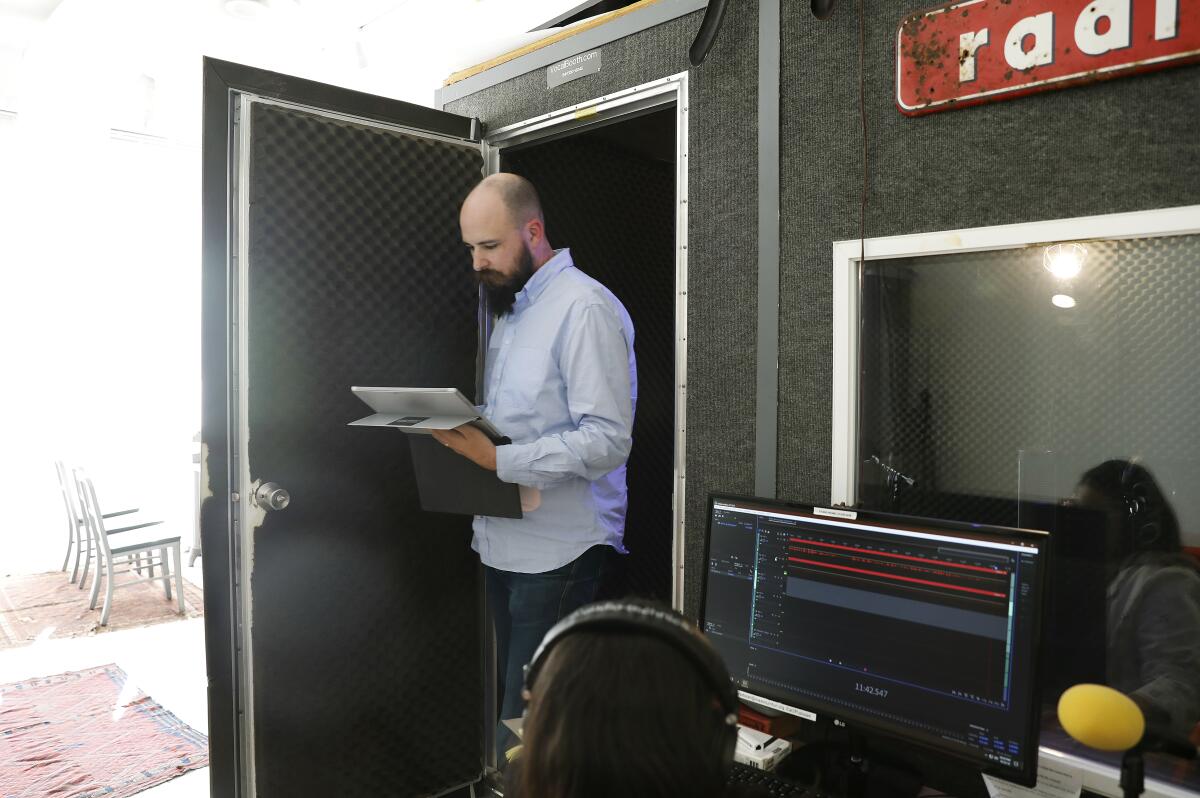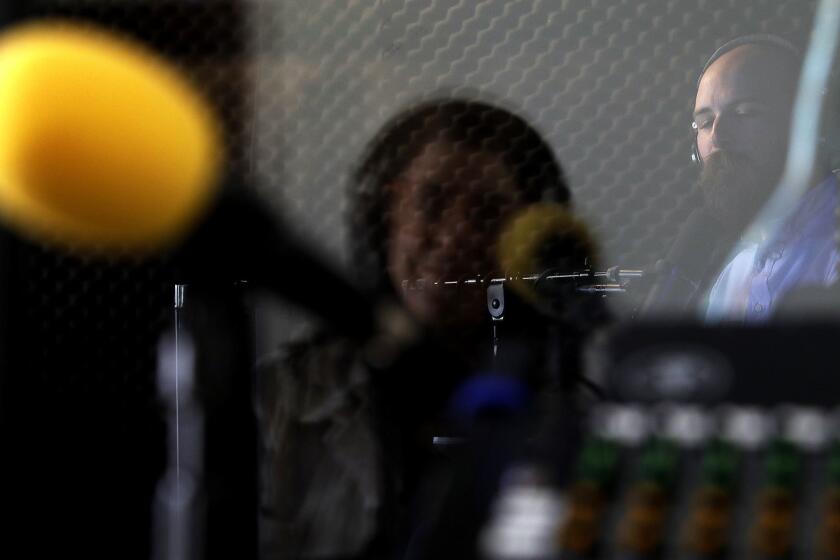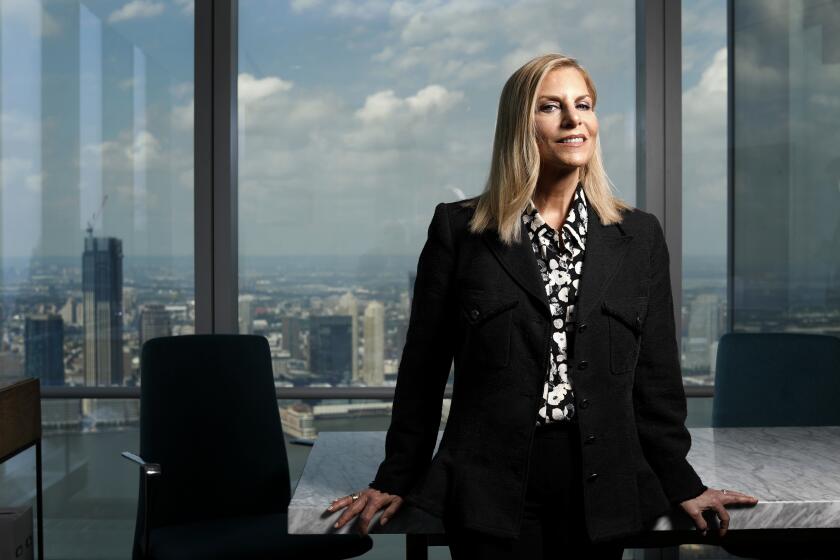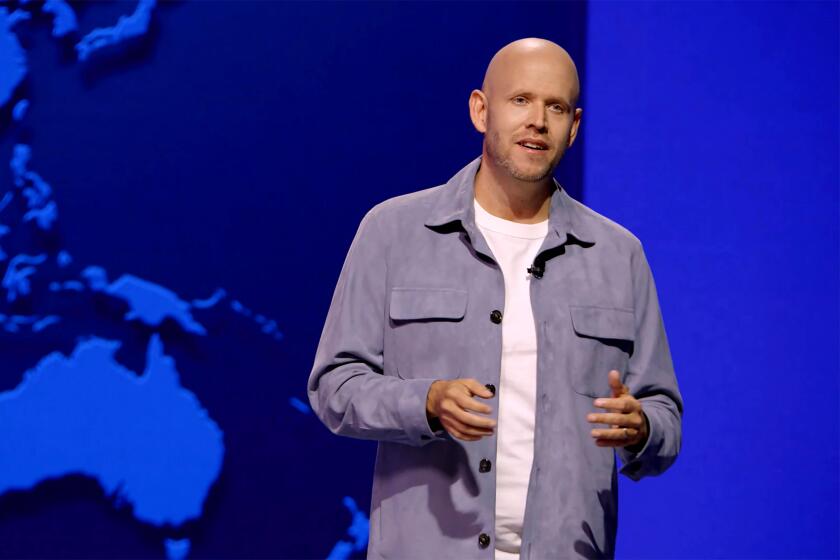His L.A.-based podcast company faced a crossroads. Now Jesse Thorn’s employees are owners

- Share via
Jesse Thorn has built a sizable audience with his podcast business Maximum Fun. His NPR interview show, “Bullseye With Jesse Thorn,” has brought on guests including Jonathan Majors, Tom Hanks and Kareem Abdul-Jabbar.
But during the last few years, he said, running the MacArthur Park-based business drove him to a breaking point. The father of three young children struggled to balance his work-life and home-life. He suffered from splitting migraines.
“You have to back off of this,” his wife, Theresa, told him at their dining room table in 2018. “I’m afraid you’re going to die.”
Then it got worse. The pandemic hit. The podcast industry consolidated as large tech companies like Amazon and Spotify snapped up startups in the audio and ad technology space.
Amid the personal and industry turmoil, Thorn faced a choice: maintain the status quo, which was unsustainable; or sell the company, which didn’t sit right.
“I had been trying to square the circle of how do I back off this stuff without selling out my colleagues or my friends that make the shows,” Thorn, 41, said.
Audiosphere: Podcast pioneer Jesse Thorn and his Maximum Fun team are building a quirky audio empire
Overlooking MacArthur Park Lake, Jesse Thorn is recording tracks for his latest “Bullseye” podcast episode inside a recording booth that he bought off Craigslist for $3,500.
Instead, he chose a third option: make the company an employee-owned operation.
On Monday, Thorn — who has co-owned Maximum Fun with his wife since it was incorporated in 2011 — announced his company would become a worker cooperative, a novel business model in the podcast industry, but one that has been tried by many small businesses including bakeries and pizza places. The ownership will be shared equally by at least 16 people, including Thorn, the company said.
The process of converting Maximum Fun into a co-op took about a year and a half, Thorn said.
Thorn said he would receive an upfront sum and a percentage of the company’s revenue for a limited number of years. The company is taking out a loan from a community development financial institutions fund.
Employees opt into becoming owners in the cooperative by paying hundreds of dollars, which goes into a trust, and they get it back with interest when they leave the company. Worker-owners also get to vote on the company’s board. The new board oversees the management structure, which is expected to remain the same, Thorn said.
Thorn declined to reveal more specific details about the financial terms of the deal, or how much money he would get from the buyout. The amount he is receiving is significantly less than what he would have gotten if he sold it to another company, he said.
Several companies expressed interest in buying Maximum Fun — a big radio firm, a medium-sized media business and a TV company — but Thorn declined to name them.
Selling would have presented its own problems. Thorn worried that employees in areas like bookkeeping would be laid off under new ownership.
Ultimately, Thorn began thinking about alternatives, which led him to Oakland-based Project Equity, a nonprofit that helps companies move to employee ownership.
“In the end, this is the way to do it that won’t ruin everything and allows the company to be owned and operated by people who I trust who are doing it for the same reasons that I was,” Thorn said.
Other businesses that are also run as worker-owned cooperatives include Atwater Village’s Proof Bakery. In recent years, firms including Great Lakes Brewing Co. and Taylor Guitars transferred ownership to workers through what’s known as an employee stock ownership plan.
“The benefits of employee ownership are that you can have much more dedication on the part of the company employees,” said Alec Levenson, a senior research scientist at USC Marshall School of Business’ Center for Effective Organizations. “They really feel like it’s theirs.”
Thorn said he had never envisioned how large his company would grow.
He began podcasting as a college student and leaned into the format after he was unable to find traditional media jobs. Thorn later became the youngest national host in public radio when Public Radio International distributed his show, “The Sound of Young America.” The show’s name changed to “Bullseye” in 2012, and it’s been distributed by NPR since 2013.
On “Bullseye With Jesse Thorn,” Thorn interviews creators and cultural icons including actor Eugene Levy, rap group Little Brother and music artist “Weird Al” Yankovic. The tone of the interviews is conversational and personal, sort of like a millennial version of “Fresh Air” with Terry Gross.
In his company’s early days, Thorn said he was just focused on helping pay the rent. Today, Maximum Fun generates millions of dollars in revenue each year, with 37 shows and 24 employees. Financial details were not disclosed.
About 70% of the company’s revenue comes from memberships, with the remaining amount from ads and live events, Thorn said.
The company is profitable, he said. But it never had ambitions of dominating the podcast space or putting exclusive programs behind a paywall. The podcasts associated with Maximum Fun are creator-owned and widely available on multiple platforms. “Bullseye” airs on public radio stations including WNYC in New York and WBEZ in Chicago.
“We weren’t in this to grab market share, and build, scale and lose money until we dominated our opponents,” Thorn said.
Spotify says it is cutting staff as it focuses on improving efficiency in a challenging economic environment, according to CEO Daniel Ek.
The podcast industry has gone through a head-spinning cycle during the last few years.
For example, Spotify in 2019 announced its plans to increase its footprint in podcasting through acquisitions, dramatically changing the landscape of what was once a fragmented market with many independent podcast production firms. Over the years, Spotify purchased podcasting studios Parcast and the Ringer and inked deals with high-profile celebrities including Prince Harry and Meghan Markle’s company, Archewell.
But this year, Spotify has come under pressure to reduce expenses. In January, Spotify’s CEO announced the company would lay off 6% of its staff and executive Dawn Ostroff, one of the chief architects of its podcast strategy, was leaving.
“There had been so much speculative money going into podcasting and sort of like a hiccup in the ad market, led to all these layoffs,” Thorn said.
Spotify announced a handful of new podcast partnerships, production tools and a Batman spinoff starring Hasan Minhaj as the Riddler.
Now, there are ramifications for many companies that poured resources into the space.
“There was just no way that all these people who did not know anything about audio production substantially spending all this money could possibly sustain their operations,” Thorn said. “They were all gamblers, basically. They were all spending other people’s money in hopes of getting lucky.”
Despite the changes, Thorn said he believes the audience for podcasts continues to grow and that Maximum Fun is well positioned. Even in today’s market, there are small- to medium-sized television production companies that thrive, and his company continues to make great content that has value, he said.
“Ultimately, we were making something that the goal was to be really valuable to the people who consumed it, and that if we did that, there was a lot of ways we could make money,” Thorn said. “It has to be a certain number of people, but it doesn’t have to be a huge infinite number of people.”
More to Read
Inside the business of entertainment
The Wide Shot brings you news, analysis and insights on everything from streaming wars to production — and what it all means for the future.
You may occasionally receive promotional content from the Los Angeles Times.














